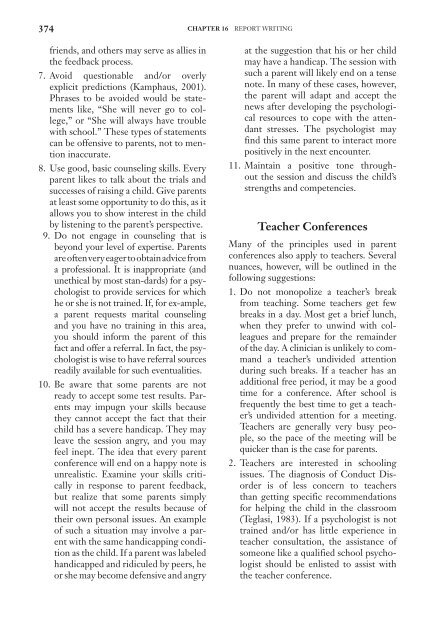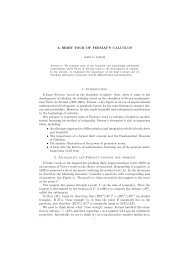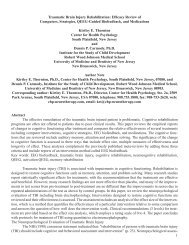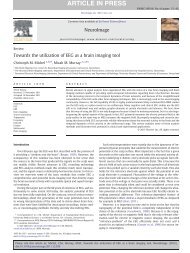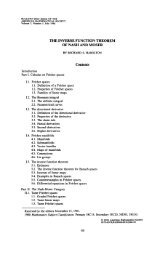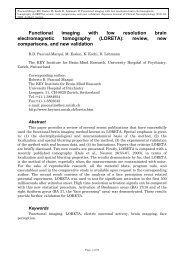- Page 2:
Clinical Assessmentof Child and Ado
- Page 5 and 6:
Paul J. FrickUniversity of New Orle
- Page 8 and 9:
C o n t e n t sPrefacexiPart IBasic
- Page 10 and 11:
contentsixChapter 12Assessing Famil
- Page 12 and 13:
P r e f a c ePsychologists offer an
- Page 14:
prefacexiiiWe have organized the te
- Page 18 and 19:
C h a p t e r 1Historical TrendsCha
- Page 20 and 21:
CHAPTER 1 HISTORICAL TRENDS5Commerc
- Page 22 and 23:
CHAPTER 1 HISTORICAL TRENDS7Robert
- Page 24 and 25:
CHAPTER 1 HISTORICAL TRENDS9These e
- Page 26 and 27:
CHAPTER 1 HISTORICAL TRENDS11search
- Page 28 and 29:
CHAPTER 1 HISTORICAL TRENDS13Box 1.
- Page 30 and 31:
CHAPTER 1 HISTORICAL TRENDS15The sc
- Page 32 and 33:
CHAPTER 1 HISTORICAL TRENDS17freque
- Page 34 and 35:
CHAPTER 1 HISTORICAL TRENDS19in the
- Page 36 and 37:
C h a p t e r 2Measurement IssuesCh
- Page 38 and 39:
CHAPTER 2 MEASUREMENT ISSUES23Ratin
- Page 40 and 41:
CHAPTER 2 MEASUREMENT ISSUES25stabi
- Page 42 and 43:
CHAPTER 2 MEASUREMENT ISSUES27Table
- Page 44 and 45:
CHAPTER 2 MEASUREMENT ISSUES29Aggre
- Page 46 and 47:
CHAPTER 2 MEASUREMENT ISSUES31l Doe
- Page 48 and 49:
CHAPTER 2 MEASUREMENT ISSUES33of sk
- Page 50 and 51:
CHAPTER 2 MEASUREMENT ISSUES35Inter
- Page 52 and 53:
CHAPTER 2 MEASUREMENT ISSUES37obtai
- Page 54 and 55:
CHAPTER 2 MEASUREMENT ISSUES39admin
- Page 56 and 57:
CHAPTER 2 MEASUREMENT ISSUES41Table
- Page 58 and 59:
CHAPTER 2 MEASUREMENT ISSUES43liter
- Page 60:
CHAPTER 2 MEASUREMENT ISSUES45of em
- Page 63 and 64:
48 CHAPTER 3 CLASSIFICATION AND DEV
- Page 65 and 66:
50 CHAPTER 3 CLASSIFICATION AND DEV
- Page 67 and 68:
52 CHAPTER 3 CLASSIFICATION AND DEV
- Page 69 and 70:
54 CHAPTER 3 CLASSIFICATION AND DEV
- Page 71 and 72:
56 CHAPTER 3 CLASSIFICATION AND DEV
- Page 73 and 74:
58 CHAPTER 3 CLASSIFICATION AND DEV
- Page 75 and 76:
60 CHAPTER 3 CLASSIFICATION AND DEV
- Page 77 and 78:
62 CHAPTER 3 CLASSIFICATION AND DEV
- Page 79 and 80:
64 CHAPTER 3 CLASSIFICATION AND DEV
- Page 81 and 82:
66 CHAPTER 3 CLASSIFICATION AND DEV
- Page 83 and 84:
68 CHAPTER 4 STANDARDS AND FAIRNESS
- Page 85 and 86:
70 CHAPTER 4 STANDARDS AND FAIRNESS
- Page 87 and 88:
72 CHAPTER 4 STANDARDS AND FAIRNESS
- Page 89 and 90:
74 CHAPTER 4 STANDARDS AND FAIRNESS
- Page 91 and 92:
76 CHAPTER 4 STANDARDS AND FAIRNESS
- Page 93 and 94:
78 CHAPTER 4 STANDARDS AND FAIRNESS
- Page 96 and 97:
C h a p t e r 5Planning the Evaluat
- Page 98 and 99:
chapter 5 Planning the Evaluation a
- Page 100 and 101:
chapter 5 Planning the Evaluation a
- Page 102 and 103:
chapter 5 Planning the Evaluation a
- Page 104 and 105:
chapter 5 Planning the Evaluation a
- Page 106 and 107:
chapter 5 Planning the Evaluation a
- Page 108 and 109:
chapter 5 Planning the Evaluation a
- Page 110 and 111:
chapter 5 Planning the Evaluation a
- Page 112:
chapter 5 Planning the Evaluation a
- Page 116 and 117:
C h a p t e r 6Self-Report Inventor
- Page 118 and 119:
CHAPTER 6 SELF-REPORT INVENTORIES10
- Page 120 and 121:
CHAPTER 6 SELF-REPORT INVENTORIES10
- Page 122 and 123:
CHAPTER 6 SELF-REPORT INVENTORIES10
- Page 124 and 125:
CHAPTER 6 SELF-REPORT INVENTORIES10
- Page 126 and 127:
CHAPTER 6 SELF-REPORT INVENTORIES11
- Page 128 and 129:
CHAPTER 6 SELF-REPORT INVENTORIES11
- Page 130 and 131:
CHAPTER 6 SELF-REPORT INVENTORIES11
- Page 132 and 133:
CHAPTER 6 SELF-REPORT INVENTORIES11
- Page 134 and 135:
CHAPTER 6 SELF-REPORT INVENTORIES11
- Page 136 and 137:
CHAPTER 6 SELF-REPORT INVENTORIES12
- Page 138 and 139:
CHAPTER 6 SELF-REPORT INVENTORIES12
- Page 140 and 141:
CHAPTER 6 SELF-REPORT INVENTORIES12
- Page 142 and 143:
CHAPTER 6 SELF-REPORT INVENTORIES12
- Page 144 and 145:
CHAPTER 6 SELF-REPORT INVENTORIES12
- Page 146 and 147:
CHAPTER 6 SELF-REPORT INVENTORIES13
- Page 148 and 149:
CHAPTER 6 SELF-REPORT INVENTORIES13
- Page 150 and 151:
CHAPTER 6 SELF-REPORT INVENTORIES13
- Page 152 and 153:
CHAPTER 6 SELF-REPORT INVENTORIES13
- Page 154:
CHAPTER 6 SELF-REPORT INVENTORIES13
- Page 157 and 158:
142 chapter 7 Parent and Teacher Ra
- Page 159 and 160:
144 chapter 7 Parent and Teacher Ra
- Page 161 and 162:
146 chapter 7 Parent and Teacher Ra
- Page 163 and 164:
148 chapter 7 Parent and Teacher Ra
- Page 165 and 166:
150 chapter 7 Parent and Teacher Ra
- Page 167 and 168:
152 chapter 7 Parent and Teacher Ra
- Page 169 and 170:
154 chapter 7 Parent and Teacher Ra
- Page 171 and 172:
156 chapter 7 Parent and Teacher Ra
- Page 173 and 174:
158 chapter 7 Parent and Teacher Ra
- Page 175 and 176:
160 chapter 7 Parent and Teacher Ra
- Page 177 and 178:
162 chapter 7 Parent and Teacher Ra
- Page 179 and 180:
164 chapter 7 Parent and Teacher Ra
- Page 181 and 182:
166 chapter 7 Parent and Teacher Ra
- Page 183 and 184:
168 chapter 7 Parent and Teacher Ra
- Page 185 and 186:
170 chapter 7 Parent and Teacher Ra
- Page 187 and 188:
172 chapter 7 Parent and Teacher Ra
- Page 189 and 190:
174 chapter 7 Parent and Teacher Ra
- Page 191 and 192:
176 chapter 7 Parent and Teacher Ra
- Page 193 and 194:
178 chapter 7 Parent and Teacher Ra
- Page 195 and 196:
180 chapter 7 Parent and Teacher Ra
- Page 197 and 198:
182 chapter 7 Parent and Teacher Ra
- Page 199 and 200:
184 chapter 7 Parent and Teacher Ra
- Page 201 and 202:
186 chapter 7 Parent and Teacher Ra
- Page 203 and 204:
188 chapter 7 Parent and Teacher Ra
- Page 205 and 206:
190 chapter 8 behavioral observatio
- Page 207 and 208:
192 chapter 8 behavioral observatio
- Page 209 and 210:
194 chapter 8 behavioral observatio
- Page 211 and 212:
196 chapter 8 behavioral observatio
- Page 213 and 214:
198 chapter 8 behavioral observatio
- Page 215 and 216:
200 chapter 8 behavioral observatio
- Page 217 and 218:
202 chapter 8 behavioral observatio
- Page 219 and 220:
204 chapter 8 behavioral observatio
- Page 221 and 222:
206 chapter 8 behavioral observatio
- Page 223 and 224:
208 chapter 8 behavioral observatio
- Page 226 and 227:
C h a p t e r 9Peer-Referenced Asse
- Page 228 and 229:
chapter 9 Peer-Referenced Assessmen
- Page 230 and 231:
chapter 9 Peer-Referenced Assessmen
- Page 232 and 233:
chapter 9 Peer-Referenced Assessmen
- Page 234 and 235:
chapter 9 Peer-Referenced Assessmen
- Page 236 and 237:
chapter 9 Peer-Referenced Assessmen
- Page 238 and 239:
chapter 9 Peer-Referenced Assessmen
- Page 240 and 241:
C h a p t e r 1 0Projective Techniq
- Page 242 and 243:
chapter 10 projective techniques227
- Page 244 and 245:
chapter 10 projective techniques229
- Page 246 and 247:
chapter 10 projective techniques231
- Page 248 and 249:
chapter 10 projective techniques233
- Page 250 and 251:
chapter 10 projective techniques235
- Page 252 and 253:
chapter 10 projective techniques237
- Page 254 and 255:
chapter 10 projective techniques239
- Page 256 and 257:
chapter 10 projective techniques241
- Page 258 and 259:
chapter 10 projective techniques243
- Page 260 and 261:
chapter 10 projective techniques245
- Page 262 and 263:
chapter 10 projective techniques247
- Page 264 and 265:
chapter 10 projective techniques249
- Page 266:
chapter 10 projective techniques251
- Page 269 and 270:
254 chapter 11 structured diagnosti
- Page 271 and 272:
256 chapter 11 structured diagnosti
- Page 273 and 274:
258 chapter 11 structured diagnosti
- Page 275 and 276:
260 chapter 11 structured diagnosti
- Page 277 and 278:
262 chapter 11 structured diagnosti
- Page 279 and 280:
264 chapter 11 structured diagnosti
- Page 281 and 282:
266 chapter 11 structured diagnosti
- Page 283 and 284:
268 chapter 11 structured diagnosti
- Page 285 and 286:
270 chapter 11 structured diagnosti
- Page 287 and 288:
272 CHAPTER 12 assessing family con
- Page 289 and 290:
274 CHAPTER 12 assessing family con
- Page 291 and 292:
276 CHAPTER 12 assessing family con
- Page 293 and 294:
278 CHAPTER 12 assessing family con
- Page 295 and 296:
280 CHAPTER 12 assessing family con
- Page 297 and 298:
282 CHAPTER 12 assessing family con
- Page 299 and 300:
284 CHAPTER 12 assessing family con
- Page 301 and 302:
286 CHAPTER 12 assessing family con
- Page 303 and 304:
288 CHAPTER 12 assessing family con
- Page 305 and 306:
290 CHAPTER 12 assessing family con
- Page 307 and 308:
292 CHAPTER 12 assessing family con
- Page 309 and 310:
294 CHAPTER 12 assessing family con
- Page 311 and 312:
296 CHAPTER 12 assessing family con
- Page 314 and 315:
C h a p t e r 1 3History TakingChap
- Page 316 and 317:
chapter 13 history taking301Box 13.
- Page 318 and 319:
chapter 13 history taking303Table 1
- Page 320 and 321:
Box 13.3Genograms, not unlike profi
- Page 322 and 323:
chapter 13 history taking307These c
- Page 324 and 325:
chapter 13 history taking309
- Page 326 and 327:
chapter 13 history taking311
- Page 328 and 329:
chapter 13 history taking313in psyc
- Page 330 and 331:
C h a p t e r 1 4Adaptive Behavior
- Page 332 and 333:
chapter 14 Adaptive Behavior Scales
- Page 334 and 335:
chapter 14 Adaptive Behavior Scales
- Page 336 and 337:
chapter 14 Adaptive Behavior Scales
- Page 338 and 339: chapter 14 Adaptive Behavior Scales
- Page 340 and 341: chapter 14 Adaptive Behavior Scales
- Page 342 and 343: chapter 14 Adaptive Behavior Scales
- Page 344 and 345: chapter 14 Adaptive Behavior Scales
- Page 346 and 347: chapter 14 Adaptive Behavior Scales
- Page 348 and 349: chapter 14 Adaptive Behavior Scales
- Page 350 and 351: chapter 14 Adaptive Behavior Scales
- Page 352: P a r t I I IAdvanced Topics
- Page 355 and 356: 340chapter 15 integrating and inter
- Page 357 and 358: 342chapter 15 integrating and inter
- Page 359 and 360: 344chapter 15 integrating and inter
- Page 361 and 362: 346chapter 15 integrating and inter
- Page 363 and 364: 348chapter 15 integrating and inter
- Page 365 and 366: 350chapter 15 integrating and inter
- Page 367 and 368: 352chapter 15 integrating and inter
- Page 369 and 370: 354chapter 15 integrating and inter
- Page 371 and 372: 356chapter 15 integrating and inter
- Page 373 and 374: 358 chapter 16 report writingand ot
- Page 375 and 376: 360 chapter 16 report writingpretat
- Page 377 and 378: 362 chapter 16 report writing1993)?
- Page 379 and 380: 364 chapter 16 report writingStuden
- Page 381 and 382: 366 chapter 16 report writingnothin
- Page 383 and 384: 368 chapter 16 report writingconclu
- Page 385 and 386: 370 chapter 16 report writingStatem
- Page 387: 372 chapter 16 report writingrecomm
- Page 391 and 392: 376 chapter 16 report writingChapte
- Page 393 and 394: 378CHAPTER 17 Assessment of Attenti
- Page 395 and 396: 380CHAPTER 17 Assessment of Attenti
- Page 397 and 398: 382CHAPTER 17 Assessment of Attenti
- Page 399 and 400: 384CHAPTER 17 Assessment of Attenti
- Page 401 and 402: 386CHAPTER 17 Assessment of Attenti
- Page 403 and 404: 388CHAPTER 17 Assessment of Attenti
- Page 405 and 406: 390CHAPTER 17 Assessment of Attenti
- Page 407 and 408: 392CHAPTER 17 Assessment of Attenti
- Page 409 and 410: 394CHAPTER 17 Assessment of Attenti
- Page 411 and 412: 396CHAPTER 17 Assessment of Attenti
- Page 413 and 414: 398CHAPTER 17 Assessment of Attenti
- Page 415 and 416: 400CHAPTER 17 Assessment of Attenti
- Page 417 and 418: 402CHAPTER 17 Assessment of Attenti
- Page 419 and 420: 404CHAPTER 17 Assessment of Attenti
- Page 421 and 422: 406CHAPTER 17 Assessment of Attenti
- Page 423 and 424: 408CHAPTER 17 Assessment of Attenti
- Page 425 and 426: 410CHAPTER 17 Assessment of Attenti
- Page 427 and 428: 412CHAPTER 17 Assessment of Attenti
- Page 429 and 430: 414 chapter 18 Assessment of Depres
- Page 431 and 432: 416 chapter 18 Assessment of Depres
- Page 433 and 434: 418 chapter 18 Assessment of Depres
- Page 435 and 436: 420 chapter 18 Assessment of Depres
- Page 437 and 438: 422 chapter 18 Assessment of Depres
- Page 439 and 440:
424 chapter 18 Assessment of Depres
- Page 441 and 442:
Box 18.2Sample Case of an Adolescen
- Page 443 and 444:
428 chapter 18 Assessment of Depres
- Page 445 and 446:
430 chapter 18 Assessment of Depres
- Page 447 and 448:
432 chapter 18 Assessment of Depres
- Page 449 and 450:
434 chapter 18 Assessment of Depres
- Page 452 and 453:
C h a p t e r 1 9Assessment of Auti
- Page 454 and 455:
chapter 19 Assessment of autism spe
- Page 456 and 457:
chapter 19 Assessment of autism spe
- Page 458 and 459:
chapter 19 Assessment of autism spe
- Page 460 and 461:
chapter 19 Assessment of autism spe
- Page 462 and 463:
chapter 19 Assessment of autism spe
- Page 464 and 465:
chapter 19 Assessment of autism spe
- Page 466 and 467:
chapter 19 Assessment of autism spe
- Page 468 and 469:
R e f e r e n c e sAAMR. (1992). Me
- Page 470 and 471:
eferenes455American Psychiatric Ass
- Page 472 and 473:
eferenes457tress on disruptive beha
- Page 474 and 475:
eferenes459in the diagnosis, assess
- Page 476 and 477:
eferenes461Crnic, K. A., & Reid, M.
- Page 478 and 479:
eferenes463Eaves, L. J., Silberg, J
- Page 480 and 481:
eferenes465tive administration of t
- Page 482 and 483:
eferenes467and on the onset of bipo
- Page 484 and 485:
eferenes469Hart, D. H. (1972). The
- Page 486 and 487:
eferenes471Jackson, M. F., Barth, J
- Page 488 and 489:
eferenes473Kline, R. B. (1989). Is
- Page 490 and 491:
eferenes475problem symptoms by elim
- Page 492 and 493:
eferenes477teacher attitudes and ac
- Page 494 and 495:
eferenes479fitt, & A. Caspi (Eds.),
- Page 496 and 497:
eferenes481Deficit Hyperactivity Di
- Page 498 and 499:
eferenes483Ricks, J. H. (1959). On
- Page 500 and 501:
eferenes485Sevin, J. A., Matson, J.
- Page 502 and 503:
eferenes487version (PIA-CV): A meas
- Page 504 and 505:
eferenes489Wang, J. J. (1992, April
- Page 506 and 507:
A u t h o r I n d e xAbad, J., 115A
- Page 508 and 509:
author index493Cohen, P., 76, 341,
- Page 510 and 511:
author index495Grimes, C.L., 219Gri
- Page 512 and 513:
author index497List-Kerz, M.L., 190
- Page 514 and 515:
author index499Prior, M., 286Prusof
- Page 516:
author index501Tinsley, B.R., 223To
- Page 519 and 520:
504 subject IndexAttention-deficit
- Page 521 and 522:
506 subject IndexConvergent/discrim
- Page 523 and 524:
508 subject IndexInformation integr
- Page 525 and 526:
510 subject IndexProjective techniq
- Page 527:
512 subject IndexStructured diagnos


